Perhaps you have already heard of eSports betting. If not, we are sure that you soon will. eSports betting has exploded in popularity recently. There was a time, in the not distant past, when the only way to compete against another human being at any particular game was if you were sitting the very same room, using the very same computer. Nowadays, gaming enthusiasts are perfectly able to do so without immediate proximity to a fellow gamer, due to the advancement of internet technologies. Such an opportunity means we can play against anyone from any part of the globe while at the comfort of our own homes. Also, to multiplayer networking options, players can nowadays increasingly explore the enormous potential of eSports.
Here we have it. Filtered lists of sports betting options with the most popular cryptos on the market.
welcome bonus
180%/720€
welcome bonus
180%/720€
welcome bonus
100%/100€+100FS
welcome bonus
100%/100€+100FS
welcome bonus
300%/€3000 + 200 FS
welcome bonus
300%/€3000 + 200 FS
welcome bonus
550% up to 4000€ + 550 FS
welcome bonus
550% up to 4000€ + 550 FS
welcome bonus
20% Cashback
welcome bonus
20% Cashback
welcome bonus
Up to 1500 AUD + 200 FS + Secret Bonus
welcome bonus
Up to 1500 AUD + 200 FS + Secret Bonus
welcome bonus
150% up to €500 + 50 Free Spins
welcome bonus
150% up to €500 + 50 Free Spins
welcome bonus
350%/3200€ + 650 FS
welcome bonus
350%/3200€ + 650 FS
welcome bonus
150%/220€
welcome bonus
150%/220€
Because eSports Betting has grown a lot and has become very popular with players, we have prepared a comprehensive section that will cover the essence of this new phenomenon in great detail and will help you understand the subject comprehensively. Let us start with the very basic topics on the subject of eSports Betting.
eSports is gaming defined by competition. What that means is that we regard playing video games with a competitive element attached to it as eSpots.
Needless to say, not all gamers play against other players and not all of them compete, and those players are known in the industry as solo gamers. However, plenty of other players prefer to enjoy some real-life competition and play against others. Most of these gamers fall in the category of player that we define as casual gamers. Casual gamers and core gamers are two types of gamers that are in the opposite spectrums when it comes to gaming and players dedication. In essence, casual gamers are not as dedicated and tend to play video games for the entertainment part of it. On the other hand, there are the core gamers who are much more dedicated; they would play online tournaments, they would also participate in organized gaming events and competitions. Although these casual and informal contests are still technically classified as eSports, the term is typically used to refer to the professional scene.
A solo gamer winning at eSports betting



eSports betting has become popular because of the availability of high quality and reliable video games that offer excellent player experience. During recent years the following Video game brands have established themselves on the market and are attracting players from all over the world to compete with each other.
The fast-developing eSports industry continues to enjoy explosive growth with a market value equivalent to roughly $ 865 million U.S. dollars in 2018. The most popular video games continuously over time are released with updates and designed to deliver better user experience and a sense of excitement. Simultaneously, a variety of new games flood the market on a regular basis, driven by the existing numerous opportunities and an ever-increasing fan base. There are a number of reasons that some games are preferred to a greater extent compared to others in terms of role-playing opportunities, optimal accessibility, and cost, to name a few. League of Legends was first launched in 2009 by Riot Games and presently keeps on dominating the eSports market with roughly 2000 professional tournaments held to date. In 2017, it was ranked 1st worldwide in terms of generated revenue. With over 10 million followers and 118, 000 streamers, League of Legends takes the lead as the most-streamed eSports game on Twitch. Second, in line is Counter-Strike: Global Offensive, developed by Valve Corporation in 2012 and launched a year later to get regarded as one of the most popular eSports games in 2018. Apart from 12.5 million units sold in 2017, CS:GO enjoys over 9 million followers on Twitch, 50,000 streamers, and roughly 3000 tournaments held to date. Last but not least, the Defence of the Ancients 2 (DOTA 2) was designed and launched by Valve Corporation in 2013 and presently continues to be an eSports powerhouse. The game generated revenue of $406 million USD in 2017. The fan base on the live streaming video platform Twitch accounts for 4 million followers with roughly 52,500 streamers. The number of tournaments held reaches about 850 to date.
The creation and the subsequent development of eSports in their professional capacity resulted in a fast-growing global game industry worth billions of dollars. Presently, the number of eSports viewers is close to 300 million worldwide and it is forecasted to rise to 500 million by 2020. Having seen the prospects and the tremendous potential of eSports at play, the live video streaming platform YouTube stroke a multi-year broadcasting deal with the eSports platform Faceit. Similarly, the leader in online gaming broadcasts Twitch was acquired by Amazon. Hence, producers of eSports software are in a fierce competition to establish dominance and make a mark on the global game market. The extensive attention and popularity attached to eSports games come from the competitive flair deliberately embedded by software producers. This shouldn’t come as a total surprise as the video games with higher revenue and positive feedback by invested fans are more or less competing products. While eSports software developers and publishers are not exactly in short supply, the competitive video gaming scene is rather steered by three key players – Valve Corporation, Riot Games and Blizzard Entertainment.
Blizzard Entertainmentis one of the biggest developers of eSports games and has been responsible for developing some of the most popular and well-liked games such asWorld of Warcraft, Hearthstone and Heroes of the Storm.Starcraft IIis another popular game developed by the company.
Riot Gamesis another big name when it comes to eSports creators. The company was established in 2006 and is based out of Santa Monica, California. Riot was responsible for developing the popular League of Legends game that currently has 67 million players participating all over the world. Riot Games has grown at a rapid pace and now has 15 offices all over the world.
Valve Corporationis yet another major eSports creator with titles includingDota 2 and Counter-Strike: Global Offensive. Dota 2 set a new eSports record when it announced a prize pool of over $18 million in the Internationals tournament.
Hi-Rez Studiosis the creator of the immensely popular game called Smite. The company based out of Atlanta, Georgia was founded in 2005. The company also has offices in Brighton, UK and Shenzen, China. Some of the other popular games that the company has developed includePaladins, Tribes and Jetpack Fighter.
Activision -Like Blizzard Entertainment, Activision is a subsidiary of Activision Blizzard. The company has been involved in the video gaming industry since 1979 and was the first independent developer of console games. Activision has been involved with several high-profile games over the years, including the Quake series, Doom 3 and Guitar Hero.Activision’s biggest link to esports is via the Call of Duty game series. They’re the owner and publishers of this series, and also operate theCall of Duty World League.
Casually playing video games is as further from professional eSports games as it gets. However, being a professional eSports player has its benefits when it comes to making a living while enjoying yourself to the utmost degree at the comfort of your own home. Like any other sport, success is achieved through consistency in exerted efforts toward pursuing greatness. In this reference, the worldwide competition among eSports players is unrelenting and popularity is attained at the cost of countless hours spent without sufficient sleep. As far as the most popular eSports players are concerned, the name Kuro Takhasomi is first to come in mind. Born in Germany in 1994, he is ranked first worldwide with total prize money earned of roughly 4 million USD from 90 tournaments. In present times, he is entitled as an active captain of Team Liquid which is recently the most successful eSports team worldwide. Second on the world ranking is even younger Johan Sundstein, originally from Denmark. As a member of Team OG, the third-best eSports team worldwide, he has earned USD 3.7 million in prize money from 100 tournaments. Another name that will certainly ring a bell to gaming fans is Amer Al-Barkawi, born in Jordan. As he is a key member of Team Liquid, it is hardly surprising that he takes third place in the world ranking with USD 3.6 million in total earnings from 44 tournaments.
As the games offer some excellent playing experience, many players worldwide are being attracted to them. Some players establish themselves as true champions of their games and are in turn earning worldwide fame. The betting companies recognized an excellent opportunity and started offering various betting options for the spectators and fans. The champions of the games started earning serious money from their playing skills and attracted sponsors and many followers. Here are some of the best eSports players in recent years.
Sweden is one of the world’s leaders in eSports and eSports is now a booming business in Sweden. Here are some of the best Swedish eSports players that have left their mark as true champions of their games.
ESports are not that different from any other professional sport in terms of essential qualities required for a participant to stand out in sharp contrast to fellow competitors and be successful. It most certainly takes the drive, discipline, commitment, self-confidence, and competitive spirit for one to make their mark in the world of games. The ranking of most prominent eSports teams is mainly defined by the overall tournament results achieved and the prize money earned. Since August 2017, Team Liquid leads the ranking with the highest overall prize money earnings of USD 24 million from 1418 tournaments. As one of the most popular teams in eSports history, it is represented by gamers across 28 different countries. Their top three players are residents from Germany, Bulgaria,and Finland, listed in descending order. Ranked second, the North American esports organization Evil Geniuses has gained total prize money of USD 20 million from 736 tournaments. It is represented across 18 countries with its best three players located in Pakistan and United States, listed in descending order. As there are roughly 500 professional eSports teams, the overview will be concluded with Team OG. Represented solely across 10 countries worldwide, it is ranked third in terms of total prize money earned, namely USD 17 million from 49 tournaments.
Sweden is one of the world’s leaders in eSports and eSports is now a booming business in Sweden. Here are some of the best Swedish eSports teams that have left their mark as true champions of their games. The three most famous Swedish eSports teams are Alliance and Ninjas in Pyjamas.
Alliance is one of the professional esports organizations in Sweden. Alliance teams compete in Dota 2, Hearthstone, the Super Smash Bros., Fortnite. Since 2016, Alliance has become a player-owned organization. The Alliance team which competes in Dota 2 is the team which the largest single prize money in esports in The International 2013. The current players include Maximilian Bröcker, Michael Vu, Samuel Svahn, Aydin Sarkohi, Tommy Le.
Ninjas in Pyjamas, also known as NiP.is one of the famous professional esports organizations based in Sweden. They are very strong on Counter-Strike. The team was started back in 2000. They were known under the names of SK Sweden and SK Scandinavia. They are the first European team to enter the Asian market. Some of their current players include f0rest, GeT_RiGhT, REZ, Lekr0, Draken (Stand-in), pita (Coach).
Having gained tremendous popularity over the recent years eSports enjoy a vast audience of inspired game fans who came to taste the excitement and witness an event or an extraordinary performance. Meanwhile, the eSports tournaments represent a great deal of opportunity for professional players to reach their shining moment and move up in the world of eSports. Impressive revenue figures along with intense publicity and larger audiences of impatient fans place certain eSports tournaments at the forefront of the game industry as opposed to others. To mention a few, Intel Extreme Masters kicks off the world ranking for a tournament to be around for the longest time since its beginning in 2006. Throughout one of the five events per year held in 2017, Intel Extreme Masters became the most attended tournament of any eSports competition with a live audience of 173,000 people and another 46 million fans watched online. Another success story and one of the most popular eSports tournaments is The International. The International was first held in 2011 with an accumulated prize pool of 1.6 million USD. Seven years later the number has dramatically bulged up to 25.3 billion USD and hence turned The International 2018 into the largest tournament in eSports history. Interestingly, this year’s iteration of the tournament was won for the first time by a team other than the usual suspects from China. The League of Legends Worlds deserves recognition as one of the most enjoyable tournaments there is. Taking place in China, it was tracked by over 73 million people worldwide with a prize pool of 4.9 million USD in 2017.
The eSports industry steps on several professional leagues and tournaments. In addition, it is predominantly represented by organizers who managed to make a name for themselves over the years. With eSports thriving at an exponential rate, it will be rather impossible to enlist all relevant leagues out there. For strictly informative purposes, there are a few leagues that will be briefly discussed without any objections for comprehensiveness. In its capacity as the largest third-party eSports organization worldwide, the Electronic Sports League (ESL) hosts pro leagues and tournaments at both national and international levels. This is conducted to a great extent thanks to existing partnerships with gaming publishers such as Blizzard Entertainment, Riot Games and Valve Corporation. Some instances include but are not limited to CS: GO Pro League, also referred as to ESL Pro League, or Dota Major Championships and Halo Championship Series both governed by ESL. Another key eSports tournament organizer is Major League Gaming (MLG) that runs the Electronic Major League Soccer (eMLS) or otherwise known as the official e-League for FIFA 18. MLG is also responsible for producing the Halo World Championship along with ESL, making it all possible to turn it into the largest eSports event for competitive Halo since 2014. Other eSports game developers run their leagues as in the case with Blizzard Entertainment and the Overwatch Leagues, which is a professional eSports league for the game Overwatch. Similarly, the League of Legends has its world championships run by Riot Games, a video game developer, and esports tournament organizer.
eSports Betting History

History of eSports betting starts with games people used to play for centuries. Games were ones strictly associated with indoor and outdoor activities implicating interactive means of collaboration among individuals. Some of the most well-known worldwide are hide-and-seek, hopscotch, capture the flag, and Simon says. Later on, the board games came to existence which allowed closer peer-to-peer interactions and more fun time spent among family members. Some of the most famous board games include chess, snakes & ladders, sorry! and monopoly. While the nostalgia over the childhood games comes with the charm, the main focus of Generation Y and Z has been rather shifted toward eSports, predisposed by the optimized technology and connectivity. The popularity of professional eSports has considerably augmented over time and has led to unprecedented attention from gambling companies. As a result eSports betting has become a game-changer and a fast-growing industry. Interestingly, the very first eSports event took place at Stamford University in the distant 1972. Eight years later The Space Invaders Championship with 10,000 participants was held. The championship is known to be the first eSports tournament ever reported.
eSports betting licensing is growing as a result of the global fast-paced eSports betting market. The eSports events have attracted unheard-off attention over the past years with a reported monthly audience size of 167 million viewers in 2018. The number is projected to rise to 276 million by 2022. The gamers mainly use YouTube and Twitch platforms to enjoy online game tournaments, while in Asia platforms such as Douyu and Huya are the primary means of live connection. In 2017, the number of minutes watched on Twitch was reported to total of 355 billion. Therefore, plenty of lucrative monetization opportunities have emerged. Furthermore, the exponential growth of the eSports betting industry is expected over the years to come. Revenues are forecasted to exceed 1.1 billion USD by 2019 and reach 3 billion USD by 2022 as media rights and sponsorships are in constant growth. Hence, eSports licensing appears to be of utmost importance to brand owners and technology companies in regards to capitalization on the broadcasting, in-game advertising, and sponsorship opportunities. Due to the major interest of many parties involved and vast attention from worldwide audiences to eSports, the live events are expected to rise in quantity and quality in terms of the extent of entertainment offered.
Indeed, there is a professional video gaming scene. Playing games might very well come with a plethora of lucrative opportunities attached to it while having much-desired fun in the meantime. The size of the eSports betting market might surprise you if you are new to it, but it is expected to reach about USD 30 billion by 2020. If you are a gamer yourself, then you realize that eSports begging can be very competitive. What is interesting is that in eSports teams can indeed compete for awards which are worth millions of dollars. A fun fact, the first video game tournament took place over 40 years ago which marked the emergence of an industry worth billions in present times. While large live audiences are attracted, these game contests are also broadcasted via online streaming services (e.g., Hulu, Sling Media, CBS Interactive, YouTube TV) to millions of fans worldwide to enjoy.
If you find yourself already captivated or merely eager to take a deep dive on the subject, please read on to discover the glare of games firsthand.
Consistent with a wide range of relevant reports carried out in the field, more than 2.5 billion people take part in video gaming in one form or another. Surprisingly enough, the video game market is forecasted to rise from US$78.61 billion in 2017 to US$90 billion by 2020. With revenue of USD 51.2 billion in the Asia Pacific, which represents the largest gaming market for 2017.
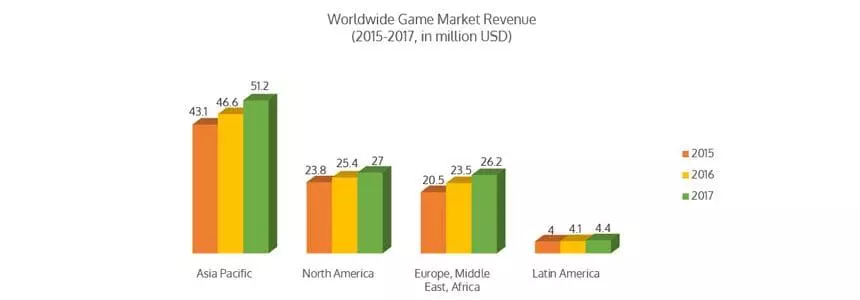

Time spent playing video games
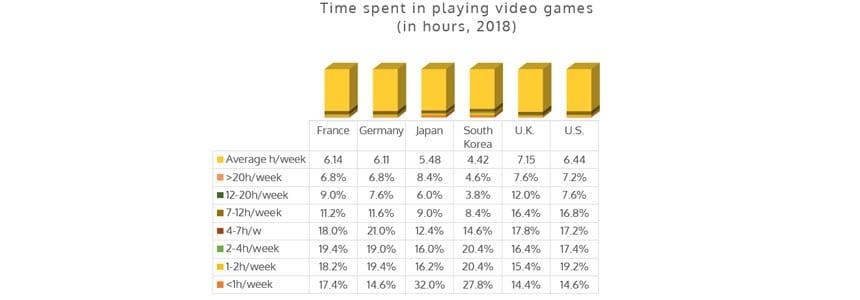

It is interesting to determine the time normally invested by game enthusiasts across different countries as an opportunity to draw some general behavioral patterns and established tendencies. What do you believe to be the average number of hours spent playing video games? What country do you find most likely to take a lead in most hours invested in playing video games? How about the most invested age group or the primary gaming device employed by gamers to lighten up the mood?
Based on data gathered from 3,000 consumers aged 18+, a few inferences can be adduced. The average number of hours per week invested by gamers in playing video games is 5.96 hours. While 20.1% of all gamers play video games less than an hour a week, the number of those invested for more than twenty hours a week represents 6.9%. Moreover, the representatives from the UK appear to be most invested in playing video games with 7.15 hours each week on average. Conversely, the representatives from South Korea appear to be least invested in playing video games with an average of 4.42 hours each week.
Time spent playing video games by age per week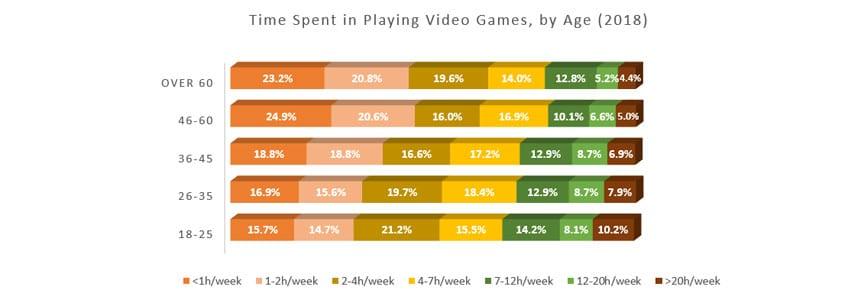

Time spent playing on different devices
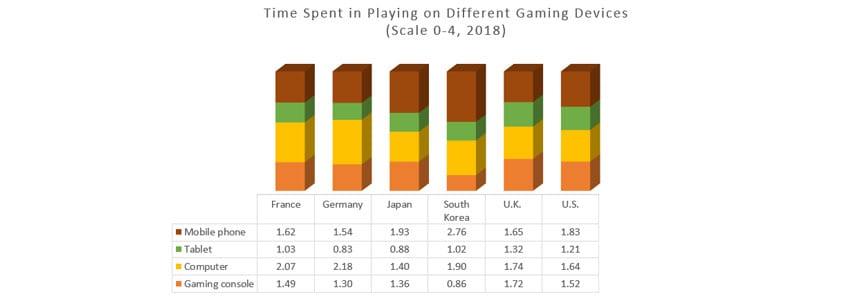

As anticipated, the time spent playing games varies across different age groups and is negatively correlated to age progression. Respondents aged 18-25 displayed a tendency to be the most willing to spend hours per week playing video games compared to all other age groups. They are most likely to invest from 7 to 20 hours from their spare time per week to play video games compared to any other age group. The average number of hours per week the generation 18-25-year-old spends in video games amounts to 7.08 hours. Interestingly enough, video games appear to be on the radar of individuals of all ages and particularly those aged 60+. The average number of hours per week that individuals aged 60+ tend to spend in video games accounts for 4.93 hours and represents the lowest among other age groups. Altogether, gamers of all age groups that normally invest less than an hour per week to play video games constitute 20.1%.
Referencing back to the study where 3000 consumers aged 18+ were surveyed, there are a few conclusions worth mentioning. The representatives from France along with those from Germany and the U.K. reported a strong preference for computers (laptops & desktops) when it comes to playing games. They selected the tablet as the least preferable means for playing among the other alternatives. In contrast, the representatives from Japan along with those from South Korea and the U.S. reported the mobile phone as the most preferable device to play video games. Altogether, the mobile phone along with the computer is the most preferable devices vs. the gaming console followed by the tablet which is the least preferable. The results are key to get a better understanding of the nature and relationship between consumers age group and playing device of choice.
Mobile devices for game playing were greatly favored by 76% of all customers. 62% of players declare a preference for PC/Mac machines which means that players use both mobile and stationary devices to play. Smartphones and tablets are forecasted to steadily establish their dominance on the global games market while more conventional appliances as TV/Console along with VR are expected to reach 26% of the global games market by 2019.
Time spent playing video games by age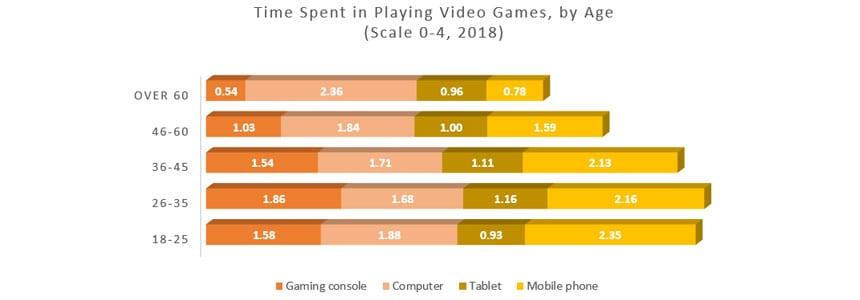

The worldwide value of PC online game market
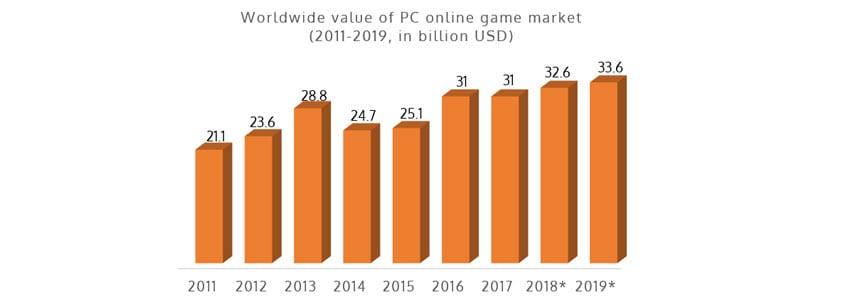

As illustrated, individuals aged 18-25 prefer mobile phones as a primary device for playing video games. The tablet is the least preferable device. The same goes for the individuals in the following two age groups in ascending order, 26-35 and 36-45. In comparison, those aged 46-60 and over were more likely to choose the computer (laptop & desktop) and least inclined to use gaming consoles and mobile phones to play video games.
All these detailed and insightful statistic serve to showcase just how popular and pervasive video gaming has become. Another fun fact, the shooter games constituted 27.5% of all video games sold in the United States for 2016 while with 75,000 content-related online articles the Overwatch became the most talked about the game in the same year.
As a separate branch of the global industry, online gaming admittedly has displayed great progress over the years, conditioned by the ever-developing internet technologies. Recent data indicate that more than half of the world’s population (55.1%) is granted access to the Internet. Contrary to common expectations and beliefs, the continent of Asia takes precedence with overall internet access of 49.0%, followed by Europe (16.8%), and Africa (11.0%). The population that inhabits the territory of Oceania/Australia has the least share of Internet usage that accounts for solely 0.7%. This statistical implication merely strives to cast light over individuals’ tendencies to use the Internet regularly as to indulge their day-to-day fads and necessities (e.g., checking of e-mails, text messaging, social networks, online games). What presents a profound interest, however, is the ability to gain a perspective on online gaming in terms of its nature and interrelationship with the global gaming industry. What deserves to be given attention is the estimated worth of the global PC online gaming market, projected to total USD 32.6 in 2018. The emergence and the further development of Internet technologies explain to a great extent why the digital and online distribution are nowadays entrenched as a preferable method of selling games. In this reference, data from 2017 substantiates the claim that video games and computer sales in digital format form reached 74% of all sales. Another intriguing statistic draws attention to the worldwide online gaming traffic that amounts to 915 petabytes/monthly for the year of 2016. The gaming traffic is projected to dramatically rise by 79% within the next three years. Consequently, the online gaming industry can surely be classified as a branch of the global gaming market with a few sub-branches, namely social gaming, mobile gaming, and MMO gaming. The latter is an abbreviation, and it is commonly utilized to refer to free-to-play as well as pay-to-play multiplayer gaming.



The Author



The Author
Site Admin